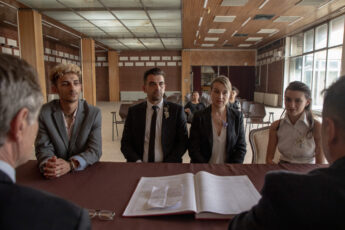
This year has been a tumultuous one on a global but also on a local level. In Gaza, relentless airstrikes and ground battles have inflicted thousands of civilian deaths and widespread destruction. In Ukraine, cities are besieged, and civilians are caught in the crossfire of a protracted territorial conflict. Within the European Union, tens of thousands of unwanted migrants have been deported back to other countries, sometimes not their own, due to complex international agreements or instances of buck-passing among nations grappling with migration policies. Images of war and deportations, accusations of genocide and ethnic cleansing inevitably draw chilling parallels to Europe’s darkest hours. As we write our December editorial in May, the memories of a generation raised with the belief that peace marks the end of history are increasingly at odds with those of a younger generation, who perceive their involvement in war as palpable, even as conflicts rage thousands of kilometers away from their homes.
This generational divide has surged most recently in the reaction towards student protests at university campuses. In response to the ongoing war in Gaza, students at numerous universities, from Sciences Po in Paris to campuses across the US, have initiated sit-ins, encampments, and demonstrations, demanding that their institutions cut ties with Israeli counterparts and divest from companies supporting Israeli military actions. These protests have been met by significant repression. In the US, images of heavily armed police arresting peaceful protesters at universities starkly contrast with the campuses’ academic freedoms. In Europe, similar scenes unfold as authorities dismantle protest camps and arrest demonstrators, indicating a broader crisis of liberal democracy being challenged by rising illiberal pressures.
The dual response of infantilizing and criminalizing the protests points at deeper societal and institutional perceptions about youth activism and the role of academic institutions in public discourse. When students are infantilized, for instance by calling their actions immature, their motivations emotional, and their demands naïve, it becomes easier to diminish the validity of their concerns. Their passionate responses to international events are then implied to be merely emotional rather than informed or rational. Such treatment reflects a broader societal tendency to underestimate young people’s capacity to engage thoughtfully with serious issues. Within an academic context, infantilizing students undermines their agency, suppresses constructive dialog, discourages critical thinking, and promotes a culture of conformity, all of which run counter to the fundamental values of university education.
The criminalization of student protests involves a harsher response where the actions of student protestors are not just dismissed but actively repressed through law enforcement. This approach treats student activism as a security threat, leading to arrests, forceful dispersals of peaceful gatherings, and disciplinary actions. It implies a view among some segments of society that universities should be insulated from political activism, maintaining a status quo that prioritizes institutional tranquility and financial or political interests over expressions of democratic dissent. Academic institutions then take on a gatekeeping role, deciding which expressions of opinion are acceptable and which must be controlled.
Violent efforts to control student expression not only undermine the educational ethos of debate and inquiry but also significantly compromise the liberty of the young, curtailing their freedom to challenge, reimagine, and potentially reshape the political landscape. The degree of tolerance towards this violence may be reflective of a tragic misalignment between academic leadership and the social dynamics of our times. One would hope that young individuals arrive at universities with a not unfounded belief that they are entering a bastion of learning and open discourse. To find their questions, concerns, and anxieties labeled as immature and potential security threats, is more than just disheartening; it actively erodes trust between students and educational institutions. That students’ trust in these institutions is dwindling under such circumstances is therefore entirely understandable, and deeply concerning for the future of academic freedom and social progress.
***
This month, we are publishing material from several film festivals across Europe. Jack Page reports from the Crossing Europe festival in Linz, where he saw Housekeeping for Beginners, a queer take on the importance of family bonds; Ultima Thule about a young man trying to escape his trauma in the remote Scottish islands of Shetland; and Forest, which follows the fate of a family whose remote and idyllic existence is uprooted by the exigency of refugees requiring their help. At DOK Leipzig, Zoe Aiano reviewed the Self-Portrait Along the Borderline, in which Anna Dziapshipa reflects on her Abkhaz identity. You will find an in-depth conversation with Dziapshipa on her film and the difficulties faced by IDPs in Georgia and elsewhere in our Interviews section. Finally, we are publishing Julia Skala’s review of Aktan Arym Kubat’s This Is What I Remember that revolves around human relationships as well as social dynamics in isolated communities in the countryside.
We hope you enjoy our reads.
Konstanty Kuzma & Moritz Pfeifer
Editors




Leave a Comment